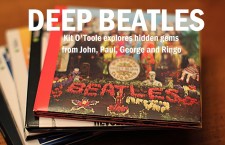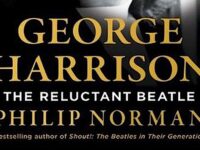Greg Kihn is best known these days for 1980s-era hits like “Jeopardy” and “The Breakup Song,” or perhaps for his longtime tenure as a DJ on San Jose’s KUFX. But he’s also been a published author since 1996, starting with “Horror Show” — which was nominated in the best first novel category of the Bram Stoker Awards.
Kihn’s fifth work of fiction, simply called Rubber Soul, is this canny mixture of a coming-of-age storyline with a murder mystery — presented within the you-were-there factual framework of Beatlemania. Kihn, in fact, got the idea from a series of radio interviews he did over the years with Paul McCartney and Ringo Starr.
The narrative for Rubber Soul turns on an alleged plot to kill the Beatles by loyalists to dictator Ferdinand Marcos while the group was on tour in the Philippines, following the real-life brouhaha over their failure to meet with the ruling family after performing there.
“Paul and Ringo’s memories of the Manila incident were still vivid, and I was able to color the story with unpublished details,” Kihn says in the book’s forward. “I tried to keep this novel as historically accurate as possible. … Using the Manila incident as the climax, the whole story just popped into my head.”
Below is an exclusive Something Else! excerpt from ‘Rubber Soul,’ which is due both in digital and paperback formats on September 3, 2013 from Premier Digital Publishing.
We join the story as the Beatles are reliving their early days in Hamburg, only now as huge international pop stars circa 1966 — and quickly tiring of the demands of touring. They remain haunted, too, by the absence of original member Stu Sutcliffe, who died of an aneurysm in 1962, commonly believed to have resulted from an earlier head injury sustained during a fight after a Beatles performance at Liverpool’s Lathom Hall. That sense of loss is only exacerbated by the appearance of Sutcliffe’s fiancee Astrid Kirchherr, often credited as the inventor of their famous mop top haircut.
Kihn’s invents a hometown friend nicknamed “Dust Bin Bob” to serve as the book’s principal voice, someone who can best describe the Beatles’ still-amazing transformation …
Ernst Merck Halle was packed. Hamburg welcomed the Beatles as their own. The German version of “She Loves You” had made them heroes. “Paperback Writer,” their latest single was flying up the charts. The Beatles were better here, Bobby noted. The boys strove to capture the magic they’d so easily created at the Kaiserkeller.
The set started with “Rock and Roll Music” by Chuck Berry, rolled through “She’s A Woman” and “If I Needed Someone.” It accelerated with “Day Tripper” and “I Feel Fine” then slowed as Paul sang “Yesterday.” Ringo picked up the tempo with “I Want To Be Your Man”. Then came “Nowhere Man” and “Paperback Writer.” The closer was “I’m Down” with Paul shouting his voice raw.
At the backstage reunion party, Bobby saw many familiar faces. Bruno Koschmider was not among them nor was Hosrt Fascher, the Kaiserkeller bouncer. No one said “Mak Shau.” Bobby felt relieved. Bettina who worked behind the bar at the Star Club made a great show of hugging all the Beatles.
“Beatles vont Prellys?” she asked with a laugh.
“Actually, yes,” John replied. “You got any?”
Bert Kaempfert, the bandleader who first recorded the Beatles backing Tony Sheridan, smiled and shook everyone’s hand.
“We were billed as the Beat Brothers back then,” Paul quipped.
Astrid looked beautiful as she glided into the dressing room. The band crowded around her. The good feelings in the room seemed to revolve around her. She and the Beatles talked for hours. It was as if they’d found a memory
and couldn’t let go. No one was looking forward to the long flight to Tokyo.
Back at the hotel someone had left a note for George under his door. He read it several times before calling Brian Epstein.
“It’s a death threat,” George said, his voice cracking. “A bloody death threat!”
“I’m sorry,” Brian said. “It’s not the first.”
“But they’re usually those idiotic scrawls in the mail. Whoever sent this got past all your security efforts and slipped it under my bloody door, right here where I’m sleeping tonight.”
Brian read the note and handed it to Mal Evans. Tony Barrow, the Beatles press officer, stood looking over his shoulder.
Mal read aloud. “You won’t live beyond next month.”
“That’s it?” Tony asked.
“That’s it,” Brian said soberly.
When Bobby entered the room, Mal whispered to him, “George just got a death threat. It was right under his door.”
Bobby went numb.
“Oh, my God.”
Brian said, “Gentlemen, we have no recourse but to take this threat seriously. I’ll contact the proper authorities, but from now on we have to be wary. We’ll have to tighten security at every level. We have to keep cool about this. Chances are it’s a hoax.”
George looked mortified.
“What if it’s serious? Somebody was serious enough to sneak up here. What if they really want to kill me? All it takes is one maniac.”
Mal said, “Do you have any idea who wrote this?”
George shrugged. “It’s Hamburg. We have a lot of strange friends here. It could be somebody from the old days who thinks we crossed him, but I can’t recall any bad blood like that.”
Bobby raised his hand.
“Brian doesn’t know about my brother. It’s time we told him.”
Brian raised an eyebrow.
“You have a brother?”
“Yes. In all likelihood he’s the man who killed Stuart Sutcliff. It happened before you met the band.”
“Do tell.”
Bobby told the story of Clive and the Beatles and how he’d kicked Stu in the head at Lathom Hall.
“The last time I saw him, he was in prison. He’s since broken out and fled the country. I hired a detective to track him down so I could give him his share of the family inheritance. He’s in Tokyo. I don’t know how much of a threat he is, but I think we should keep a sharp watch. He hates the Beatles.”
“You think he did this?” Mal held the note aloft.
Bobby shook his head.
“It’s not his style. Clive is more of a thug than a note writer, and he’s on the other side of the world.”
“That’s where we’re going,” said Brian.
Bobby said, “The thought of Clive and the Beatles in the same city makes me nervous.”
Brian put a hand on George’s shoulder.
“It’s probably nothing, George, but, we’re going to take appropriate measures. You know I would never let anything happen to you.”
George stared glumly at the floor.
“I better get some sleep.”
“Good idea. We’ll put you in different suites on another floor and double security. Then we can all get some rest. We’ll talk on the plane tomorrow.”
Once everyone was settled, Bobby lay in his bed and tried to sleep. Though he was dead tired, his mind refused to slow down. He tossed and turned until the wake-up call.
The Beatles didn’t like long plane rides. They read, smoked, and fidgeted. A few hours into the flight, Brian Epstein called for an impromptu meeting.
“We’ve all been under a lot of stress lately and I just want to say how much I appreciate everyone’s efforts. The police have the note and they’re doing everything possible to find the author. We’ve radioed Tokyo for additional security. The promoter there is working with the police to ensure our protection. I’ve spoken to the British Embassy. Our Ambassador is aware of the situation. I want you all to feel safe. Our job is to get you boys on and off the stage with complete security. Your job is to play the music your fans want to hear.”
Brian paused. Bobby saw a flicker of self doubt in his eyes, but it was gone in an instant, replaced by a boyish smile.
“I know you’ve all been wondering about the future of the Beatles touring. I know how you feel.”
“Do you?” said John, his voice dripping sarcasm.
George, who hadn’t said a word for the entire flight, cleared his throat.
“I can’t speak for the others but I’m finished. I can’t handle another tour after this. It’s become too much.”
“It’s not the Beatles without George,” Paul said.
John said, “If George is out, I’m out.”
“Where does that leave me?” said Ringo. “You guys get all the songwriting royalties. I get none of that. The only real money I get is from live shows.”
Brian said, “You’ve got performance royalties coming from the record company, Ringo.”
“You know what I mean, Brian. It’s not the same.”
George sighed. “It’s not the money. I just can’t stand it anymore.”
“It’s not fun anymore,” John said. “We sound bloody awful.”
“What I’m saying is that I don’t want to do the American tour,” said George.
A moment of silence passed.
Brian said, “If you’re absolutely sure you won’t go and there’s a group consensus then I’ll have to cancel it. We’ll lose millions of dollars. I’ve already accepted deposits that will have to be returned.”
John and Paul exchanged glances.
“Millions?”
“I’ll call the American promoter and find out how much it would cost to cancel the tour. If necessary, I will pay it out of my own pocket. I won’t make you do something against your will.”
John said, “Let’s wait until after this tour and decide when we get back to London. There’s only two stops left. It’s less than a week. Fair enough, George?”
George nodded. “OK.”
The captain announced that due to a typhoon in Japan, they were rerouting through Alaska where they would refuel. Flying into Anchorage, Bobby watched pristine wilderness give way to cinderblock and asphalt. He hoped it wasn’t a bad omen.
- Ernesto Cervini’s Turboprop, “When I Fall” (2024): Video premiere - March 15, 2024
- Disaster Pony,“Dead Neon & The Noon Sun” from ‘Disaster Pony’ (2024): Video premiere - February 27, 2024
- Christopher Hoffman, “Farewell Forever” from ‘Vision Is The Identity’ (2024): Streaming premiere - February 19, 2024



